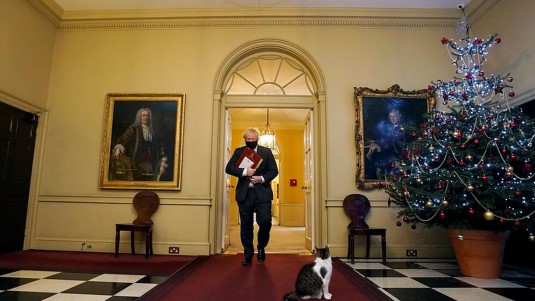Why *That Party* Matters

Yet at the same time, despite the thunder and fury of a boisterous Prime Minister's Questions and a real crisis convulsing Johnson's leadership, as John McDonnell notes there was barely a whisper about the Nationality and Borders bill as it passed through the Commons this afternoon. Some have suggested PartyGate is a dead cat strategy to distract attention from the real scandal, as if the broadcast and news media, apart from a couple of exceptions, would have brought out the punitive, illiberal, and pathetically cowardly character of the proposed legislation if this was an otherwise quiet news day. Others have taken a different tack. It goes along these lines: 160,000 dead and more incapacitated by long-term illness, the right to protest is being legislated away, kids go hungry, the right of citizenship can be snatched away from six million Britons at a whim, and people are getting excited by a fucking party. The hectoring implication is the public aren't getting upset by the right issues, and are therefore moronic, infantile, and completely thick.
This attitude on the part of some leftists is wrong, but understandable. The Corbyn interlude raised expectations that were cruelly dashed by a relentless campaign of lies and calumny. And that was from those supposedly on the same side. The stakes were high, and were raised even further by the global pandemic. Yet the bedrock of Tory support has only just started to crumble, so faced with mass support for the architects of so much ruin is it any wonder despair comes knocking, followed by bewilderment when something so inconsequential captures the public's attention?
Yes, but despair isn't a luxury we have time for. When things don't go our way (and, in fact, when they do) we have to make an effort to understand what's going on. Why PartyGate has mattered when worthier issues don't comes down to its immediacy. The key ideological prop pushed by all corners of the establishment is popular sacrifice. For over 40 years, this has cohered around work and used to leverage a negative class consciousness. This opposes those who do sacrifice (i.e. work) to those who "don't" - the unemployed, those receiving social security, and permutations of "freeloading" migrants and refugees. In other words, people who are portrayed as living off their (past or present) sacrifice. It's pernicious because it plays to something we all have to do as working people.
Since the Tories introduced precautions and restrictions in early 2020, in his tacky Churchillian affectations Johnson has gone out of the way to flatter the British people's patience and sacrifices. We all have stories of what these sacrifices entailed - our social lives, our jobs, our mental health, our family time. There are the heartbreaking, scarring memories too, of leaving vulnerable friends and relatives alone for months at a time, of not being there when loved ones were admitted to hospital. The guilt of not being at the bedside when they died. Covid and the precautions introduced to mitigate it have produced something akin to a universal experience, of us all having had to give something up. The right to protest, the revocation of British citizenship, and hungry kids are not universal experiences. For millions they are a million miles away and socially distant. But Covid rules and rule breaches, particularly by those who created the rules and oversee them are immediately, viscerally real. And provocative.
This is compounded by the character of Johnson himself. His appeal for those who supported him in 2019, apart from the obvious, is his anti-political, irreverent character. He thumbs his nose to constitutional niceties and British proprietaries. He sticks it to the EU. He's said the unsayable about Muslims. But deep down, most of the Tory vote, particularly those won in recent years, knows he holds them in as much contempt. What they don't like, however, is having their noses rubbed in it. For the governing layer of Tories, the rules are for the little people, so by disregarding them and lying about it Johnson is confirming the plebeian status of his voters in the minds of these voters. They're getting the feeling they've been mugged.
What this means is a moment pregnant with opportunity. Not only is Johnson's hypocrisy getting blown wide open, the incestuous and chummy networks of the top correspondents and the media outlets they work for are in the spotlight. The tearful resignation of Stratton isn't about to derail the story, and even the announcement of Plan B is unlikely to make it go away. After all, the details of the other gatherings are yet to come out. There have been many crises of Johnsonism, and this probably doesn't mean his departure is imminent. But it's very difficult to see how he can recover the levels of support he enjoyed as recently as this summer. We could well be at the beginning of his very welcome end.
Image Credit